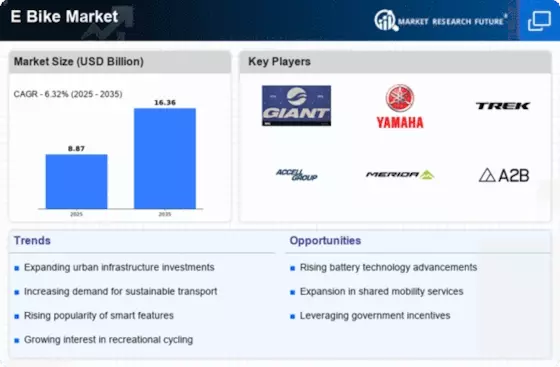Market Trends
Key Emerging Trends in the Southeast Asia Electric Bike Market
In recent years, the Southeast Asia electric bike market has experienced significant growth, driven by a confluence of factors including increasing urbanization, rising environmental awareness, and the need for efficient and cost-effective transportation solutions. Across countries like Thailand, Indonesia, Malaysia, Vietnam, and the Philippines, the market for electric bikes has been steadily expanding, with a notable shift towards eco-friendly mobility options.
One prominent trend in the Southeast Asia electric bike market is the growing demand for electric scooters and bicycles as alternatives to traditional gasoline-powered vehicles. With concerns over air pollution and the need to reduce carbon emissions, consumers are increasingly turning to electric bikes as a cleaner mode of transportation. This trend is particularly pronounced in densely populated urban areas where traffic congestion and pollution levels are high.
Another key factor driving market growth is the increasing availability and affordability of electric bikes. As technology advances and economies of scale come into play, the cost of electric bikes has been steadily decreasing, making them more accessible to a wider range of consumers. Additionally, government incentives and subsidies aimed at promoting sustainable transportation have further encouraged the adoption of electric bikes across the region.
In addition to affordability, technological advancements have also played a significant role in shaping market trends in Southeast Asia. Electric bike manufacturers are continually innovating to improve battery life, charging times, and overall performance. This has led to the development of more efficient and reliable electric bikes that are capable of covering longer distances on a single charge, thereby addressing concerns related to range anxiety.
Furthermore, changing consumer preferences and lifestyle trends are influencing the design and features of electric bikes in the region. There is a growing demand for stylish and versatile electric bikes that cater to different user needs, whether it be daily commuting, recreational cycling, or last-mile delivery services. As a result, manufacturers are introducing a wide range of electric bike models with varying designs, power outputs, and functionalities to meet diverse market demands.
The rise of electric bike sharing and rental services is also contributing to market growth in Southeast Asia. These services provide consumers with convenient and affordable access to electric bikes on a short-term basis, eliminating the need for ownership and maintenance. As urban populations continue to grow and cities become increasingly congested, electric bike sharing programs offer a sustainable and flexible mobility solution that aligns with the evolving needs of urban dwellers.
Looking ahead, the Southeast Asia electric bike market is poised for continued expansion as governments, businesses, and consumers alike prioritize sustainability and environmental responsibility. With ongoing investments in infrastructure, policy support, and technological innovation, electric bikes are expected to play an increasingly integral role in the region's transportation landscape. As such, market players will need to remain agile and responsive to evolving trends and consumer preferences to capitalize on the immense opportunities presented by the burgeoning electric bike market in Southeast Asia.



















Leave a Comment